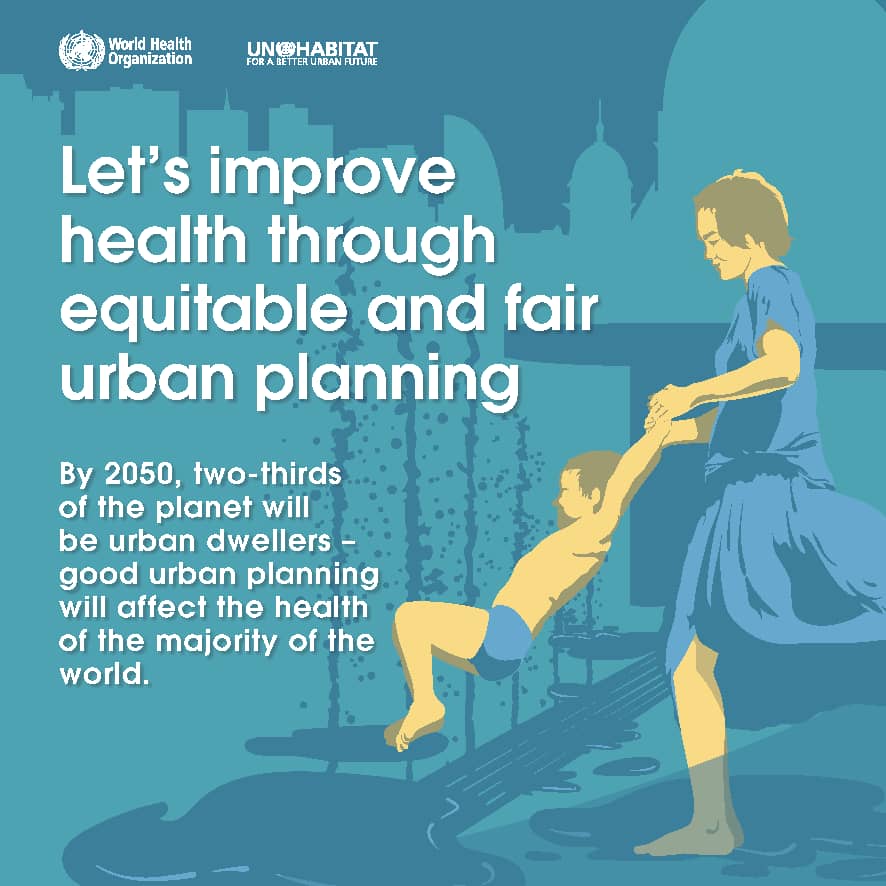As the COVID-19 pandemic continues to highlight the importance of safe distancing in cities, a new sourcebook launched by WHO and UN-Habitat provides a wealth of useful information on ensuring human health is a key consideration for city planning.
The sourcebook, Integrating Health in Urban and Territorial Planning , is designed to guide decision makers from the public health, urban and territorial planning sectors including planners, city managers, health professionals and others towards developing cities planned and built with a focus on human and environmental health.
Many cities face health threats linked to urban and territorial planning. Infectious diseases thrive in overcrowded cities, or where there is inadequate access to clean water, sanitation and hygiene facilities; living in unhealthy environments killed 12.6 million people in 2012 and air pollution killed 7 million people in 2016. However only 1 in 10 cities worldwide meet standards for healthy air,
“If the purpose of urban planning is not for human health, then what is it for?” said Dr Maria Neira, WHO Director, Department of Environment, Climate Change and Health. “Ideally, cities are planned for adequate standards of living and working, sustained economic growth, social development, environmental sustainability, better connectivity… but the ‘why’ at the core of all these things comes down to physical and mental health and wellbeing.”
“Investments in health-based urban and territorial planning secure long-term health and wellbeing legacies for a growing proportion of humans,” said Dr Nathalie Roebbel, WHO Unit Head, Air Quality and Health.
Over half the world’s population now lives in cities, and by 2050 that is expected to rise to a full 70 per cent of the human population. However, 75 per cent of the infrastructure that will be in place by then has not yet been built.
This presents an opportunity to build transformative urban areas, especially as the world begins to build back with a greater consciousness of the links between space and health.
One essential consideration is equity as there are substantial differences in health opportunities and outcomes within and across urban areas. The sourcebook is based on the premise that public health and urban planning both aim for fair and equitable outcomes and access to essential services.
“Urban and territorial planning provides a framework to align and transform our built and natural environments. Putting human and environmental health back into the core of the urban and territorial planning process and principles will enable the full potential of our cities and territories to deliver healthier and resilient environments,” said Laura Petrella, UN-Habitat Chief of Planning, Finance and Economy.
The sourcebook offers a comprehensive variety of resources, including frameworks, entry points, guidance and tools, as well as specific case studies illustrating recommended approaches to bring together planning and public health.
The tools include a variety of health appraisal, analysis and data tools, such as city-wide public space assessment, health impact assessment, cumulative risk and comparative risk assessments, spatial epidemiology, online analytical tools, citizen science, city dashboards and city profiling.
The sourcebook explains why health needs to be a part of urban and territorial planning and how to make it happen.
It also includes how to choose the best entry points for health — whether by setting, outcome, principle or sector — whatever the urban or territorial planning process, at any level.
“Urban and territorial planning is a vehicle for health improvement and ultimately for achieving the New Urban Agenda and the many targets associated with urban health and the Sustainable Development Goals – applying a health ‘lens’ to this process ensures all the determinants of health are considered,” said Shipra Narang Suri, Chief of UN-Habitat’s Urban Practices Branch.




